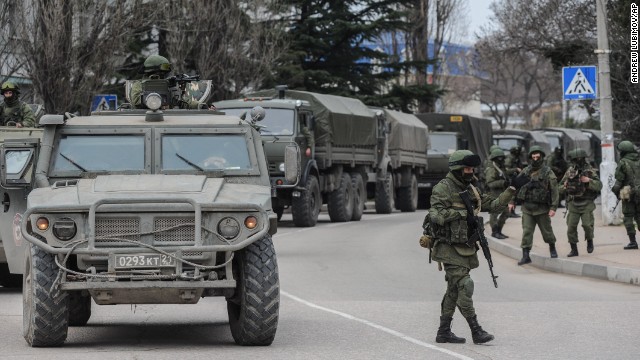 Troops stand guard in Balaklava, Crimea, on Saturday, March 1. Ukraine suspects Russia of sending new troops into Crimea and provoking separatist tensions in the region. Crimea is an autonomous republic of Ukraine with an ethnic Russian majority. It's the last large bastion of opposition to Ukraine's new political leadership after President Viktor Yanukovych's ouster.
Troops stand guard in Balaklava, Crimea, on Saturday, March 1. Ukraine suspects Russia of sending new troops into Crimea and provoking separatist tensions in the region. Crimea is an autonomous republic of Ukraine with an ethnic Russian majority. It's the last large bastion of opposition to Ukraine's new political leadership after President Viktor Yanukovych's ouster. 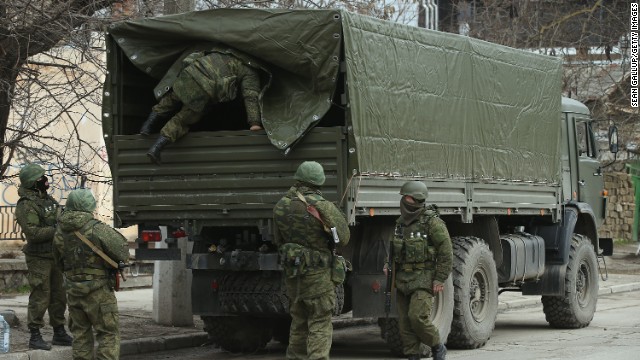 Heavily armed soldiers displaying no identifying insignia maintain watch in Simferopol, Ukraine, on March 1.
Heavily armed soldiers displaying no identifying insignia maintain watch in Simferopol, Ukraine, on March 1. 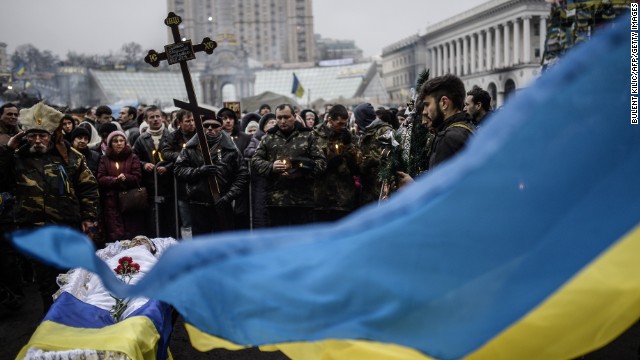 People gather around a coffin of a man who was killed during clashes with the riot police in Kiev's Independence Square.
People gather around a coffin of a man who was killed during clashes with the riot police in Kiev's Independence Square. 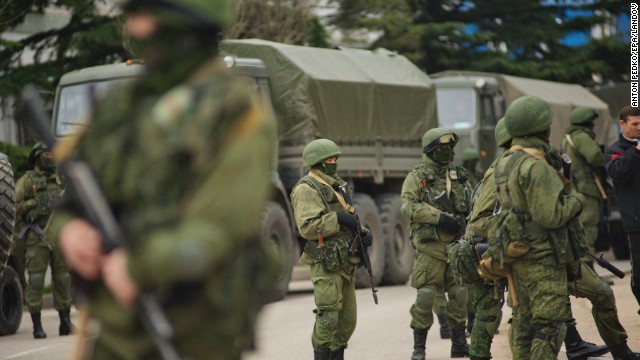 Armed men in military uniform block a Ukrainian military base in Balaklava on March 1.
Armed men in military uniform block a Ukrainian military base in Balaklava on March 1.  Pro-Russian activists hold Russian flags during a rally in the center of Donetsk, Ukraine, on March 1.
Pro-Russian activists hold Russian flags during a rally in the center of Donetsk, Ukraine, on March 1. 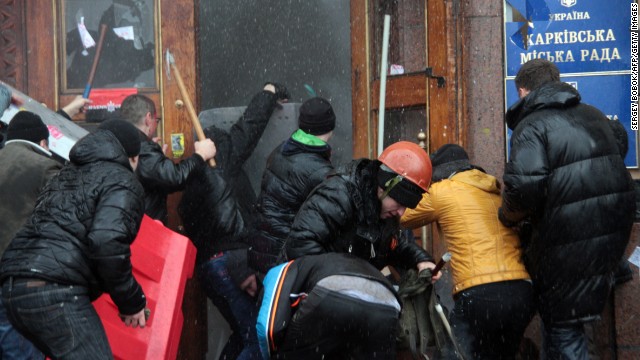 Pro-Russian activists clash with Maidan supporters as they storm the regional government building in Kharkiv on March 1.
Pro-Russian activists clash with Maidan supporters as they storm the regional government building in Kharkiv on March 1. 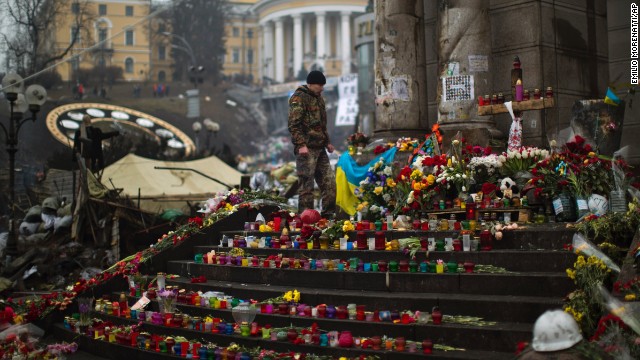 A protester stands at a memorial on March 1 for the people killed in clashes with the police at Kiev's Independence Square.
A protester stands at a memorial on March 1 for the people killed in clashes with the police at Kiev's Independence Square. 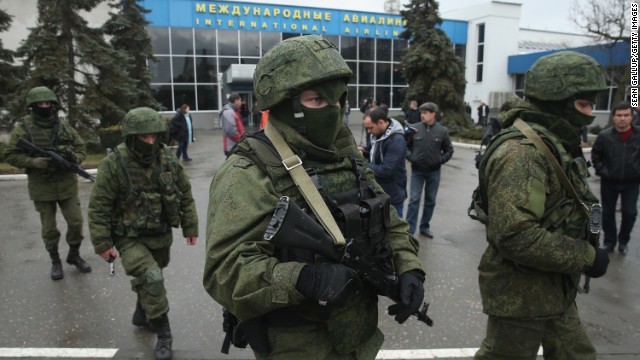 Armed men patrol outside the Simferopol International Airport in Ukraine's Crimea region on Friday, February 28. Simferopol is the regional capital of Ukraine's Crimea.
Armed men patrol outside the Simferopol International Airport in Ukraine's Crimea region on Friday, February 28. Simferopol is the regional capital of Ukraine's Crimea. 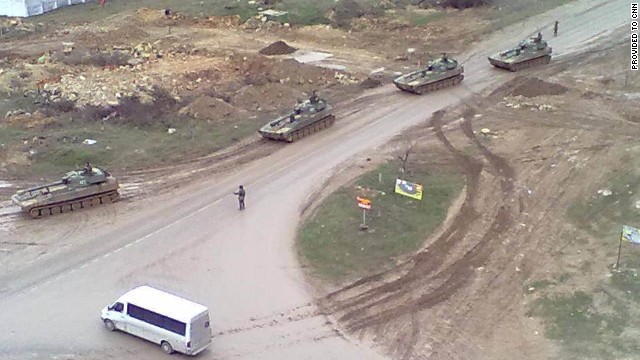 An image provided to CNN by a local resident shows Russian tanks on the move in Sevastopol, Ukraine.
An image provided to CNN by a local resident shows Russian tanks on the move in Sevastopol, Ukraine. 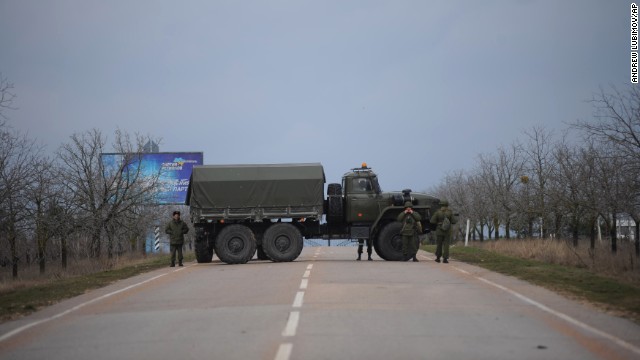 Russian troops block a road February 28 toward the military airport in Sevastopol, Ukraine, on the Black Sea coast. The Russian Black Sea Fleet is based at the port city of Sevastopol. Ukraine suspects Russia of fomenting tension in the autonomous region of Crimea, which might escalate into a bid for separation by its Russian majority.
Russian troops block a road February 28 toward the military airport in Sevastopol, Ukraine, on the Black Sea coast. The Russian Black Sea Fleet is based at the port city of Sevastopol. Ukraine suspects Russia of fomenting tension in the autonomous region of Crimea, which might escalate into a bid for separation by its Russian majority. 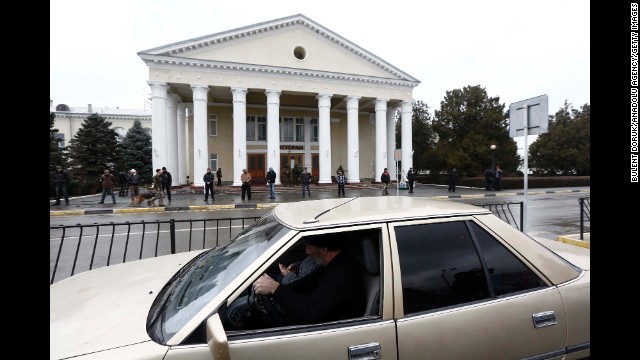 Armed men stand guard in front of a building near the Simferopol airport on February 28.
Armed men stand guard in front of a building near the Simferopol airport on February 28. 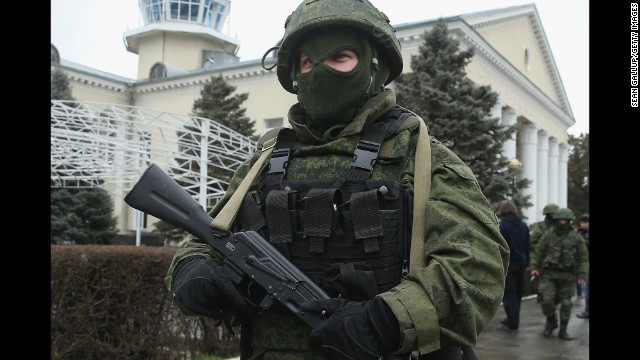 An armed man wearing no identifying military insignia patrols outside Simferopol International Airport on February 28.
An armed man wearing no identifying military insignia patrols outside Simferopol International Airport on February 28. 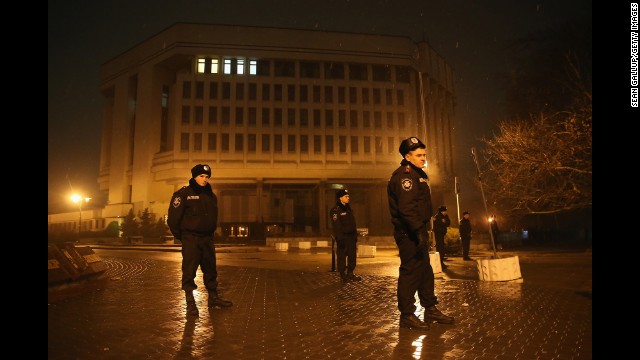 Police stand guard outside the Crimea regional parliament building in Simferopol on Thursday, February 27. Armed men seized the regional government administration building and parliament in Crimea.
Police stand guard outside the Crimea regional parliament building in Simferopol on Thursday, February 27. Armed men seized the regional government administration building and parliament in Crimea. 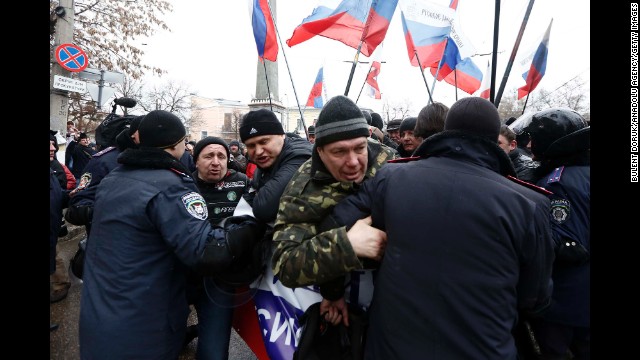 Police intervene as Russian supporters gather in front of the parliament building in Simferopol on February 27.
Police intervene as Russian supporters gather in front of the parliament building in Simferopol on February 27. 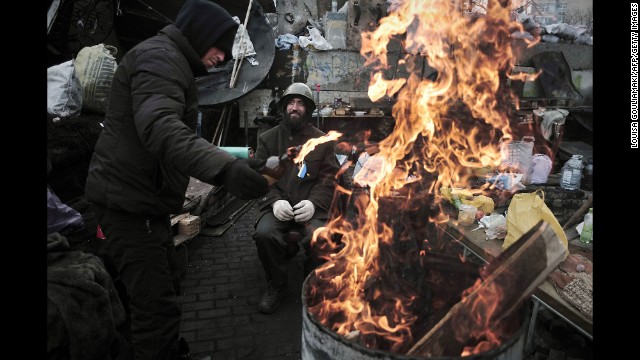 A man adds fuel to a fire at a barricade on Kiev's Independence Square on February 27. Dozens of people were killed last week during clashes between security forces and protesters.
A man adds fuel to a fire at a barricade on Kiev's Independence Square on February 27. Dozens of people were killed last week during clashes between security forces and protesters. 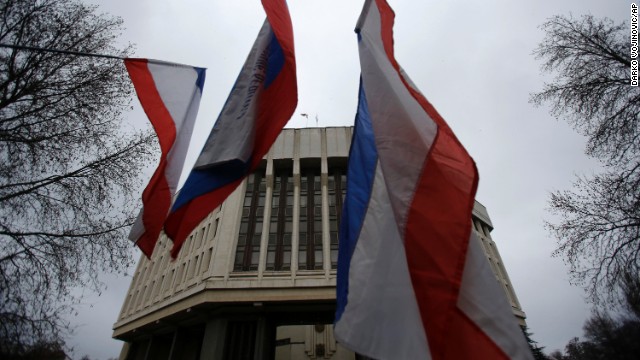 Pro-Russia demonstrators wave Russian and Crimean flags in front of a local government building in Simferopol on February 27.
Pro-Russia demonstrators wave Russian and Crimean flags in front of a local government building in Simferopol on February 27.  Barricades in front of a government building in Simferopol on February 27 hold a banner that reads: "Crimea Russia." There's a broad divide between those who support the pro-Western developments in Kiev and those who back Russia's continued influence in Crimea and across Ukraine.
Barricades in front of a government building in Simferopol on February 27 hold a banner that reads: "Crimea Russia." There's a broad divide between those who support the pro-Western developments in Kiev and those who back Russia's continued influence in Crimea and across Ukraine. 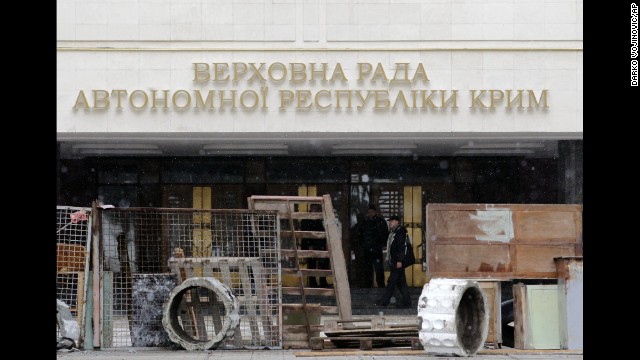 Protesters stand in front of a government building in Simferopol on February 27. Tensions have simmered in the Crimea region since the Ukraine president's ouster.
Protesters stand in front of a government building in Simferopol on February 27. Tensions have simmered in the Crimea region since the Ukraine president's ouster. 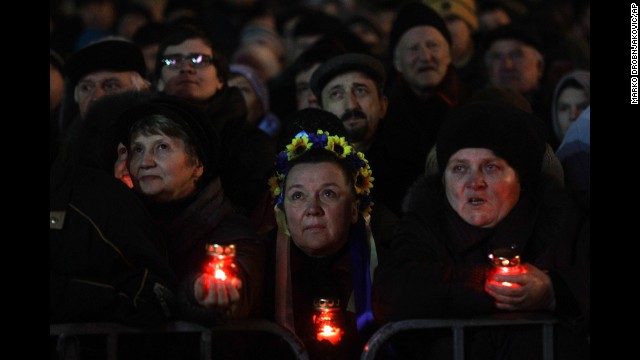 Protesters in support of the president's ouster rally in Kiev's Independence Square, which has been the center of opposition, on Wednesday, February 26.
Protesters in support of the president's ouster rally in Kiev's Independence Square, which has been the center of opposition, on Wednesday, February 26. 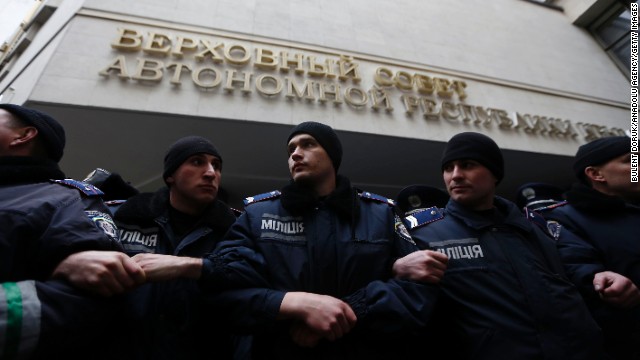 Security forces stand guard during clashes between opposing sides in front of Crimea's parliament building in Simferopol on February 26.
Security forces stand guard during clashes between opposing sides in front of Crimea's parliament building in Simferopol on February 26. 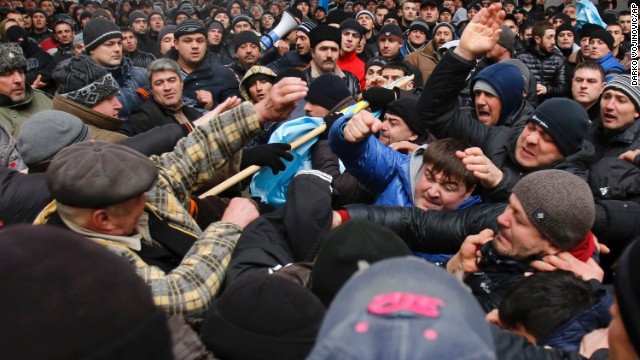 Pro-Russian demonstrators, right, clash with anti-Russian protesters in front of a government building in Simferopol on February 26.
Pro-Russian demonstrators, right, clash with anti-Russian protesters in front of a government building in Simferopol on February 26. 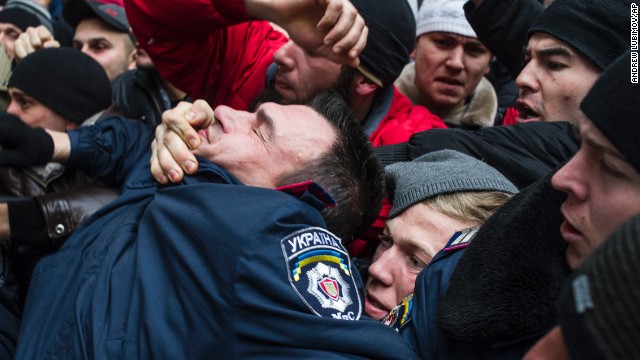 A police officer gets pulled into a crowd of Crimean Tatars in Simferopol on February 26. The Tatars, an ethnic minority group deported during the Stalin era, is rallying in support of Ukraine's interim government.
A police officer gets pulled into a crowd of Crimean Tatars in Simferopol on February 26. The Tatars, an ethnic minority group deported during the Stalin era, is rallying in support of Ukraine's interim government.  A man places flowers at a barricade near Kiev's Independence Square on February 26.
A man places flowers at a barricade near Kiev's Independence Square on February 26. 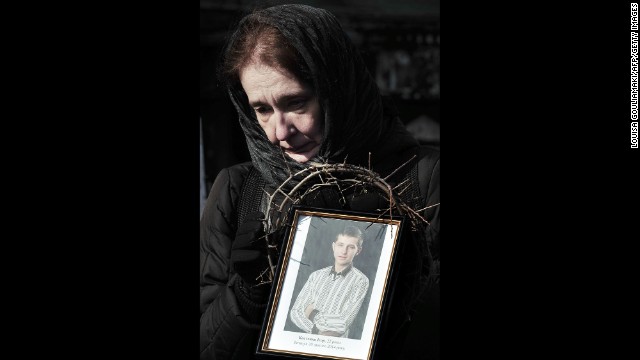 A woman holds a photograph of a protester killed during the height of tensions on February 26 in Kiev.
A woman holds a photograph of a protester killed during the height of tensions on February 26 in Kiev. 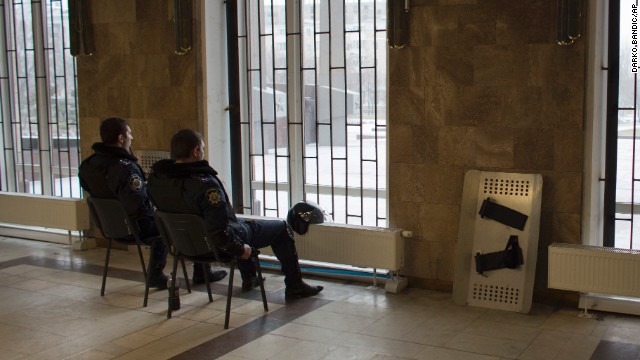 Police guard a government building in Donetsk in eastern Ukraine on February 26.
Police guard a government building in Donetsk in eastern Ukraine on February 26.  Protesters remove a fence that surrounds Ukraine's parliament in Kiev on February 26.
Protesters remove a fence that surrounds Ukraine's parliament in Kiev on February 26. 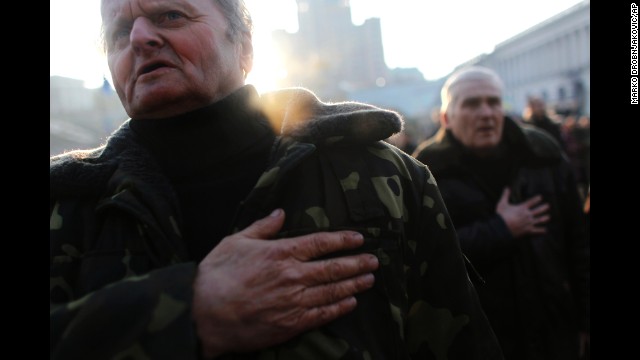 People sing the Ukrainian national anthem at Kiev's Independence Square on Monday, February 24.
People sing the Ukrainian national anthem at Kiev's Independence Square on Monday, February 24. 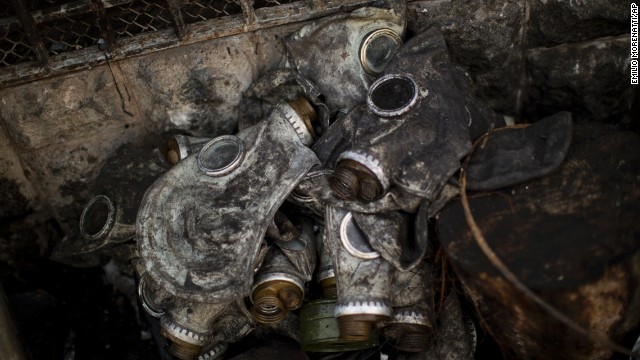 Gas masks used by protesters sit next to a barricade in Independence Square on February 24.
Gas masks used by protesters sit next to a barricade in Independence Square on February 24. 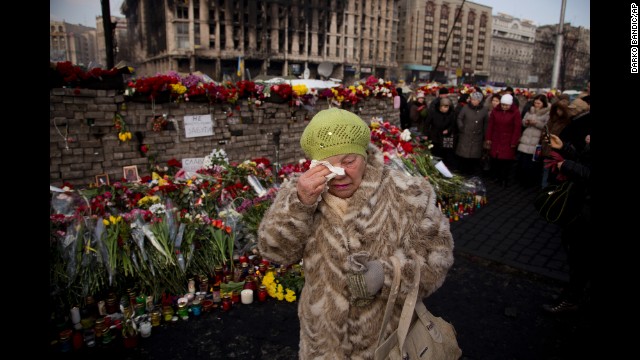 A woman cries February 24 near a memorial for the people killed in Kiev.
A woman cries February 24 near a memorial for the people killed in Kiev. 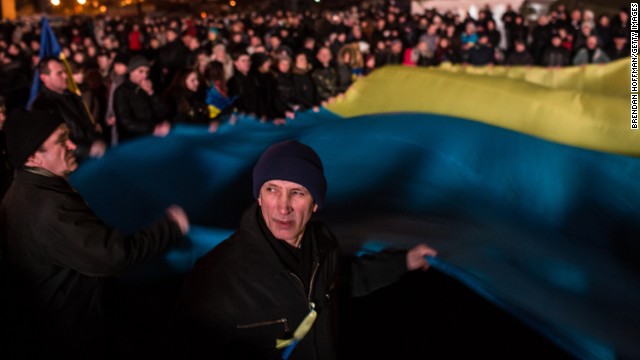 People wave a large Ukrainian flag in Independence Square on Sunday, February 23.
People wave a large Ukrainian flag in Independence Square on Sunday, February 23. 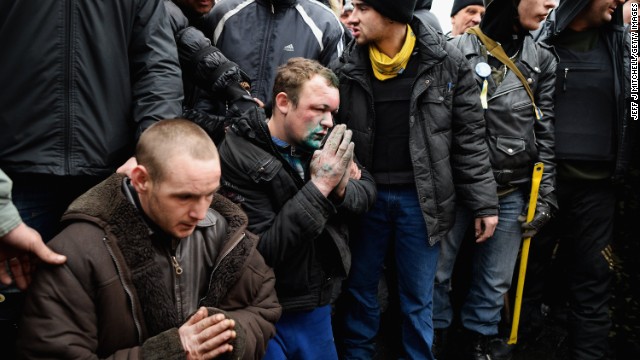 Two pro-government supporters are made to pray February 23 in front of a shrine to dead anti-government protesters.
Two pro-government supporters are made to pray February 23 in front of a shrine to dead anti-government protesters. 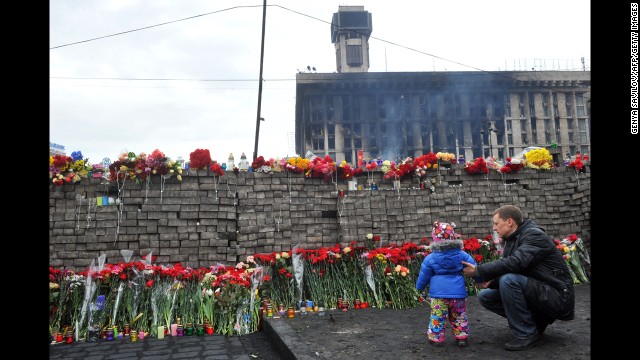 A man and his daughter lay flowers at a memorial for protesters killed in Independence Square.
A man and his daughter lay flowers at a memorial for protesters killed in Independence Square. 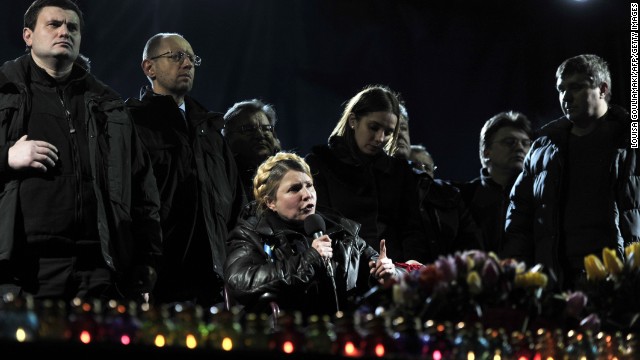 Former Prime Minister Yulia Tymoshenko speaks at Independence Square on Saturday, February 22, hours after being released from prison. Tymoshenko, considered a hero of a 2004 revolution against Yanukovych, was released after 2½ years behind bars.
Former Prime Minister Yulia Tymoshenko speaks at Independence Square on Saturday, February 22, hours after being released from prison. Tymoshenko, considered a hero of a 2004 revolution against Yanukovych, was released after 2½ years behind bars. 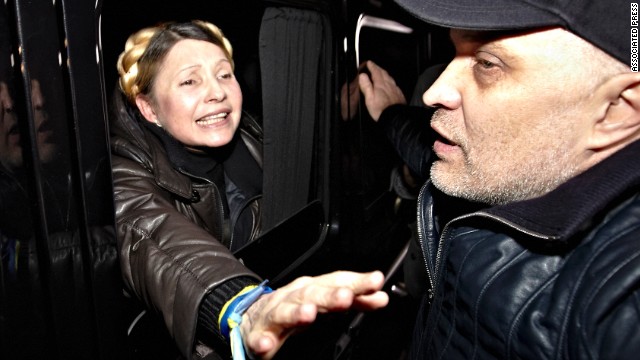 Tymoshenko is greeted by supporters shortly after being freed from prison in Kharkiv on February 22.
Tymoshenko is greeted by supporters shortly after being freed from prison in Kharkiv on February 22. 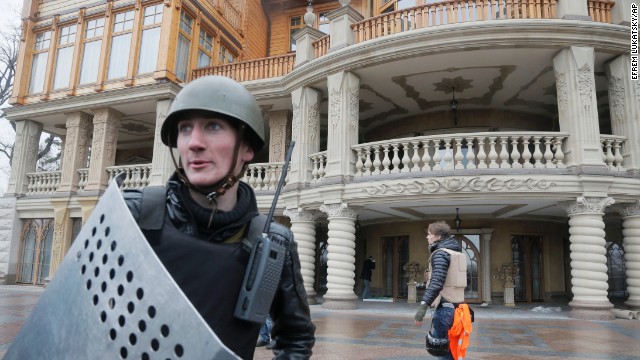 A protester guards the entrance to Yanukovych's abandoned residence outside Kiev on February 22.
A protester guards the entrance to Yanukovych's abandoned residence outside Kiev on February 22. 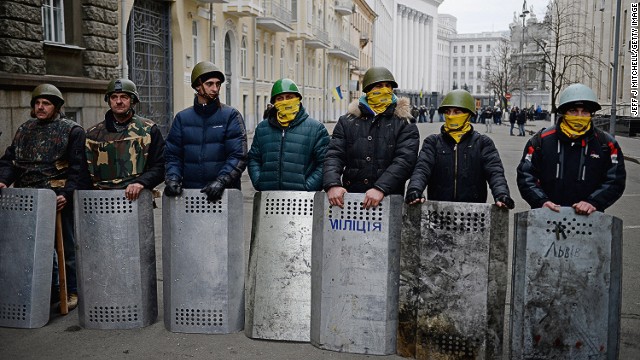 Anti-government protesters guard the streets next to the presidential offices in Kiev on February 22.
Anti-government protesters guard the streets next to the presidential offices in Kiev on February 22.  Anti-government protesters drive a military vehicle in Independence Square on February 22. Many protesters said they wouldn't leave the square until Yanukovych resigned.
Anti-government protesters drive a military vehicle in Independence Square on February 22. Many protesters said they wouldn't leave the square until Yanukovych resigned. 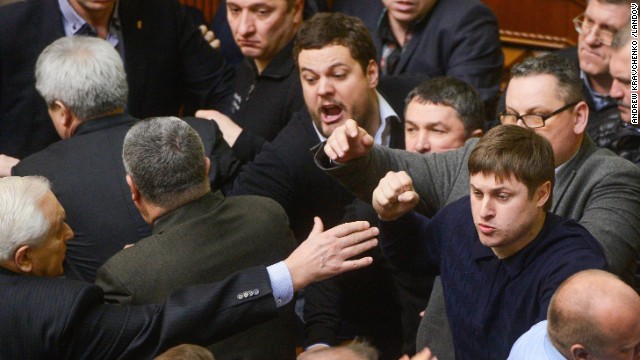 Ukrainian lawmakers argue during a session of Parliament on Friday, February 21.
Ukrainian lawmakers argue during a session of Parliament on Friday, February 21. 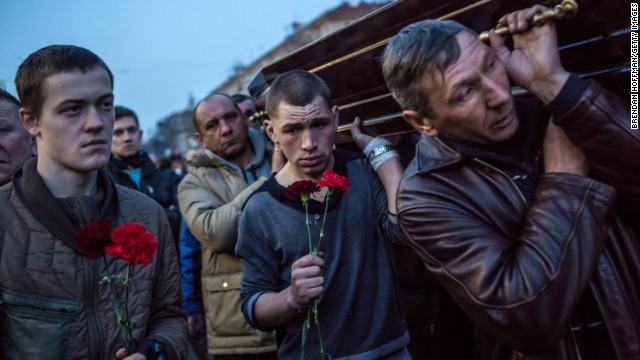 Men in Kiev carry a casket containing the body of a protester killed in clashes with police.
Men in Kiev carry a casket containing the body of a protester killed in clashes with police. 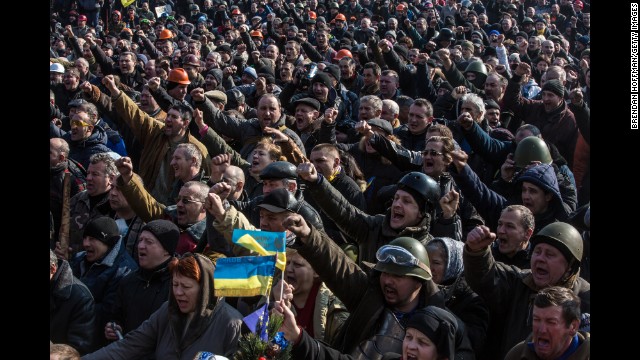 Protesters cheer after news of an agreement between the opposing sides in Kiev on February 21.
Protesters cheer after news of an agreement between the opposing sides in Kiev on February 21.
- Armed men seize parliament building in Ukraine's Crimea region
- Crimea is last big bastion of opposition to new government in Kiev following President's ouster
- Tensions have simmered since President Yanukovych's overthrow last week
- Forbrig: Ukraine must decide if it's worth risking recent progress over restive Crimea
Editor's note: Joerg Forbrig is a Berlin-based program director and Eastern Europe expert with the German Marshall Fund of the United States. The views expressed in this commentary are solely his.
(CNN) -- The world's eyes may have been focused on the breathtakingly fast political changes unfolding in Ukraine's capital Kiev this week, but it is the Crimean peninsula, where dozens of gunmen raised the Russian flag over parliament Thursday, that should now be the primary source of concern for Ukraine's fledgling government and world leaders.
Crimea is an autonomous republic whose history has long been marred by political tension. Gifted to Ukraine by Soviet Union leader Nikita Khrushchev in 1954, its population is ethnic Russian by just over half and Ukrainian by a quarter, while more than ten percent are Crimean Tatars who are fiercely anti-Russian as a result of Joseph Stalin's repression of the group a half century ago.
Russia's strategically important Black Sea naval fleet is hosted at Sevastopol, the region's largest city, an arrangement that controversially extended until 2042 by the ousted Ukrainian President Viktor Yanukovych, who was last seen fleeing Kiev. His whereabouts are unknown.
The large Russian population of Crimea has long viewed the central government of Ukraine with suspicion. In recent days the mood has turned into aggressive hostility towards the new authorities in Kiev. Crimean Russians see the newly-powerful opposition movement as illegitimate, sponsored by the West, and even fascist. Anti-Ukrainian protests are being held, Russian vigilante groups have sprung up across Crimea, Russian flags have been hoisted on government buildings, clashes have broken out between Russian separatists and loyalist Tatars and Ukrainians, and the Russian military has been seen patrolling key buildings and infrastructure.
 Gunmen seize Crimean parliament
Gunmen seize Crimean parliament  Tensions rise over Crimean peninsula
Tensions rise over Crimean peninsula  Putin call behind Yanukovych truce?
Putin call behind Yanukovych truce?  Fears of Ukraine split sparks protests
Fears of Ukraine split sparks protests The Russian Federation has done precious little to contain this dangerous dynamic. On the contrary, its state-sponsored media have covered the unrest in Crimea extensively and reiterated the Kremlin's view of the events in Kiev as a coup d'état. Envoys from Moscow have descended on Crimea to promise Russian citizenship to all who want it and even the region's re-integration into Russia proper.
Meanwhile, Russia's foreign ministry is warning of violations of the human rights of ethnic Russians in Ukraine, while the Russian military is reportedly preparing lists for the evacuation of the families of seamen serving at Sevastopol. Snap military exercises have been ordered by Russian President Vladimir Putin close to Ukraine's borders. In short, the Kremlin is stoking the fires of the building separatism that can be observed in Crimea, despite its official commitment to non-interference and the territorial integrity of Ukraine.
This situation bears all the hallmarks of several long-standing, often referred to as "frozen", conflicts in Eastern Europe. In Transnistria, a breakaway region of Moldova, in Nagorno-Karabakh, which is contested by Armenia and Azerbaijan, or in Abkhazia and South-Ossetia, which have seceded from Georgia, Russia has long propped up separatists, providing political backing, military support, funding and passports. This undermines the stability of its smaller neighbors, challenges those nations' sovereignty, blocks domestic reforms, and impedes European integration.
By underwriting Crimean separatism, Russia is taking the first steps toward repeating such a scenario in Ukraine. So while many in Kiev and in Western capitals are pondering what Russia will do next, the the Kremlin has already made its decision.
Russia's choice of tactics is no coincidence. Rather, it is based on a sober analysis of the post-Euro-Maidan situation in Ukraine, particularly Kiev, and of Russia's limited leverage there. The hoped-for public mayhem and political stalemate have not materialized. Western acceptance of the new government thwarts Russian claims of its illegitimacy. The country's industrial east shows little inclination to move closer to Russia, and Western financial aid is shaping up to reduce Ukraine's dependency on money from Moscow. In this constellation, Crimea is the "weakest link" in Ukraine today.
This leaves the new Ukrainian government with a very difficult choice. It is obliged by the constitution to defend the territorial integrity of Ukraine, to re-establish public order in Crimea, and to guarantee the safety of its citizens there, irrespective of their ethnic background. However, the central government is only just regaining control over the situation, and faces enormous political, economic and social challenges. Its resources are already stretched without having to deal with a strong separatist movement and its even stronger external backer. What is more, Europe and the U.S. will be of very limited help in confronting Crimean separatists and their Russian masters.
Ukraine's choice, then, is between consolidating the gains of the Euro-Maidan revolution across most of the country, and risking it all to maintain control over a historically reticent part of Ukraine that may already be lost. The question that has to be answered now is whether Crimea is a price worth paying for getting Ukraine on track for democracy and European integration.
MAP: How Ukraine is divided
READ: Gunmen seize Crimean parliament
READ: Eyewitness to Kiev massacre
The views expressed in this commentary are solely those of Joerg Forbrig.